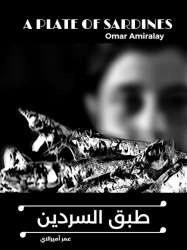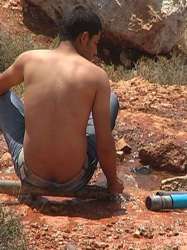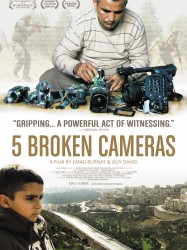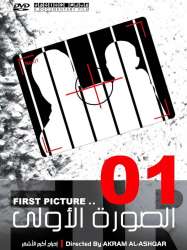There Are So Many Things Still to Say is a film of genre Documentary directed by Omar Amiralay
There Are So Many Things Still to Say (1997)

If you like this film, let us know!
There Are So Many Things Still to Say (Arabic: وهناك أشياء كثيرة كان يمكن أن يتحدث عنها المرء) is a Syrian documentary film by the director Omar Amiralay. The film was based on an interview with Syrian playwright Saadallah Wannous a few months before he died of cancer.
Comments
Leave comment :
Suggestions of similar film to There Are So Many Things Still to Say
There are 5 films with the same director, 8975 with the same cinematographic genres, 13692 films with the same themes (including 1 films with the same 9 themes than There Are So Many Things Still to Say), to have finally 70 suggestions of similar films.If you liked There Are So Many Things Still to Say, you will probably like those similar films :

A Plate of Sardines (1997)
, 17minutesDirected by Omar Amiralay
Origin France
Genres Documentary
Themes Films set in Africa, Films about religion, Documentary films about war, Documentary films about historical events, Documentary films about religion, Political films, Films about Jews and Judaism
Actors Mohamed Malas
Rating70%





Un homme se souvient du conflit au Moyen-Orient à travers sa mémoire personnelle. Dans ce court documentaire, Amiralay se penche sur la première fois qu'il a entendu parler d'Israël. A travers des conversations enregistrées avec le cinéaste Mohamed Malas, Amiralay et Malas partagent leurs propres histoires et expériences sur Israël et l'occupation israélienne.

Directed by Omar Amiralay
Genres Documentary
Themes Films about religion, Films about terrorism, Documentary films about law, Documentary films about war, Documentary films about historical events, Documentary films about politics, Documentary films about religion, Documentary films about terrorism, Political films, Films about Islam

Nights of the Jackal (1988)
, 55minutesDirected by Abdellatif Abdelhamid, Omar Amiralay
Origin France
Genres Drama, Documentary
Themes Documentaire sur une personnalité, Documentary films about politics, Political films
Rating71%






A Flood in Baath Country (2003)
, 48minutesDirected by Omar Amiralay
Origin France
Genres Documentary
Themes Documentary films about politics, Political films
Rating73%





 , 1h20
, 1h20Directed by Omar Amiralay
Genres Documentary
Themes Environmental films, Documentary films about business, Documentary films about environmental issues
Rating69%






Origin Israel
Genres Documentary
Themes Films set in Africa, Films about writers, Films about religion, Documentary films about law, Documentary films about war, Documentary films about historical events, Documentaire sur une personnalité, Documentary films about politics, Documentary films about religion, Political films, Films about Jews and Judaism
Rating65%






To Die in Jerusalem (2007)
, 1h15Origin Israel
Genres Documentary
Themes Films set in Africa, Films about religion, Documentary films about law, Documentary films about war, Documentary films about historical events, Documentaire sur une personnalité, Documentary films about politics, Documentary films about religion, Political films, Films about Jews and Judaism
Rating69%






Interrupted Streams (2010)
, 1h15Origin Israel
Genres Documentary
Themes Films set in Africa, Environmental films, Films about religion, Documentary films about law, Documentary films about environmental issues, Documentary films about war, Documentary films about historical events, Documentaire sur une personnalité, Documentary films about politics, Documentary films about religion, Political films, Films about Jews and Judaism
Paths of lives are crossed in one village in the West Bank. Along the broken water pipelines, villagers walk on their courses towards an indefinite future. Israel that controls the water, supplies only a small amount of water, and when the water streams are not certain nothing can evolve. The control over the water pressure not only dominates every aspect of life but also dominates the spirit. Bil-in, without spring water, is one of the first villages of the West Bank where a modern water infrastructure was set up. Many villagers took it as a sign of progress, others as a source of bitterness. The pipe-water was used to influence the people so they would co-operate with Israel’s intelligence. The rip tore down the village. Returning to the ancient technique of collecting rainwater-using pits could be the villagers’ way to express independence but the relations between people will doubtfully be healed.

Five Broken Cameras (2011)
, 1h34Origin Israel
Genres Drama, War, Documentary, Crime
Themes Films set in Africa, Films about films, Films about religion, Documentary films about business, Documentary films about the film industry, Documentary films about law, Documentary films about war, Documentary films about historical events, Documentaire sur une personnalité, Documentary films about politics, Documentary films about religion, Political films, Films about Jews and Judaism, Documentary films about films
Rating78%





There are five cameras — each with its own story. When his fourth son, Gibreel, is born in 2005, self-taught cameraman Emad Burnat, a Palestinian villager, gets his first camera. At the same time in his village of Bil’in, the Israelis begin bulldozing village olive groves to build a barrier to separate Bil'in from the Jewish Settlement Modi'in Illit. The barrier's route cuts off 60% of Bil'in farmland and the villagers resist this seizure of more of their land by the settlers.

First Picture (2007)
, 27minutesGenres Documentary
Themes Films set in Africa, Films about religion, Documentary films about law, Documentary films about war, Documentary films about historical events, Documentaire sur une personnalité, Documentary films about politics, Documentary films about religion, Political films, Films about Jews and Judaism
Rating75%





 Connection
Connection